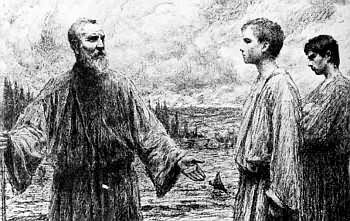 Did you happen to notice the correlation between the old testament reading for Mass today and the gospel? Actually, the responsorial psalm also carries this same theme. Sin, rebellion, a change of heart and righteousness.
Did you happen to notice the correlation between the old testament reading for Mass today and the gospel? Actually, the responsorial psalm also carries this same theme. Sin, rebellion, a change of heart and righteousness.
The first reading started out by saying:
“Woe to the city, rebellious and polluted, to the tyrannical city! She hears no voice, accepts no correction; In the Lord she has not trusted, to her God she has not drawn near.”
There may be some saints among us that never strayed from God, especially in their teenage or young adult years, but they are often the exception. Many teenagers and young adults reject at least part of their upbringing. At the time they are doing so, onlookers may think they are a lost cause. Here in America, a very famous, internationally known Protestant preacher named Billy Graham, had a son named Franklin. Franklin grew up, rejected his father’s religion and lived a wild life of parties, drinking binges, and immoral behavior with women. Low and behold though, he eventually came around and even took over his father’s place in ministry. (Franklin Graham even led the nation in prayer when American president George Bush was elected.)
Franklin Graham’s life was quite a spectacle, living in the limelight of his father’s fame. Everyone knew all about the sinful life he had been living. Yet, he underwent a genuine conversion and turned away from an immoral life, and eventually became a Protestant minister himself, and assumed his father’s role in the ministry.
Even though Franklin Graham is a Protestant, it doesn’t mean we do not have anything to learn from our modern day Protestant brothers and sisters. Franklin is a very good example of the scriptures we are reading about for Mass today. In ancient times, Saint Augustine in our own church underwent a very similar conversion too though. Most of us know his story already. But, something both of these men have in common was: rebellion, rejection of their Christian faith, a change of heart and righteousness.
Franklin Graham and Saint Augustine both accepted Christ’s forgiveness and was able to put their sins behind them and go on down the path to holiness. Sometimes accepting Jesus’s forgiveness is the hardest part. We can accept that we have sinned a lot easier sometimes, than accept that we have been forgiven. And this isn’t just the case with major, mortal sins either. Often a hurtful word or action that wounded a loved one, eats at us more deeply than missing a Mass on Sunday. Both of these kinds of sins can be forgiven in confession, but wounding a loved one leaves scars sometimes that may never completely heal. Forgiving yourself is hard. Accepting Christ’s forgiveness, is sometimes hard too, especially if the person you wounded hasn’t forgiven it and let it go.
Very few of us ever go our entire life without doing something we are very ashamed of, and perhaps do not want anyone else to know about it. Ex-convicts are a good example of this, but we are like this too, in small ways.
There are a lot of people who feel like they have sinned so much that they can’t even enter a church. Churches repel them because they know their lifestyle is contrary to what is taught there. Everyone is so pure and perfect that attends Mass in the beautifully decorated churches, and they may feel like they do not have the clothes to fit in with everyone else, or have nothing in common with the people who go there.
Notice Jesus in today’s gospel though. He did not repel those who were living a sinful lifestyle. He drew them near. They came close. They listened, and they recognized the truth in the words he spoke. In their heart, they knew his words were true. In their heart, they felt his love for them, and his acceptance of them, just as they were, in whatever condition of life they were in at the time. Jesus healed them, because he drew them near to himself. After their conversion, these prostitutes and sinners were more righteous than the superbly religious people of their time.
The question for all of us this Advent, is – do we do the same? Do we draw people near to us? Do they feel our acceptance, care and concern for them and their wellbeing? When we stumble upon a person on drugs, living a promiscuous lifestyle, or have other well known sins, do we treat them differently because of their sins? Do we make them feel ashamed of themselves, in any way? It is a fine line to not condone the behavior, but to accept the person.
Jesus gave us a parable today about one son who said he would work in his father’s vineyard, but didn’t – and the other son who said no that we wouldn’t work in his father’s vineyard, but changed his mind and did so. Have you ever considered that maybe the son who changed his mind and went to work in the vineyard after all, did so because he loved his father? Maybe after he rebelled against his father, he remembered all the loving things his father had done for him, so he decided to do what he asked.
This is just something to think about today. That love is what draws people near and causes their conversion. It isn’t the rules that heal, but love.
